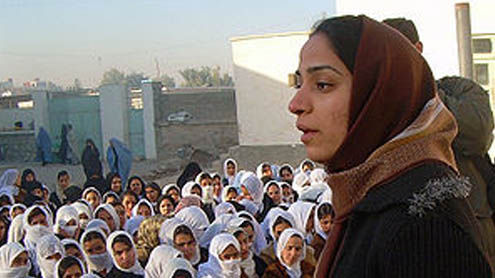 With all the depressing news coming out of Pakistan lately, there is one major development that has me hopeful and excited. Last month saw the launch of the Teach For Pakistan movement, which aims to expand the urban poor’s access to quality education by recruiting highly qualified young Pakistanis to teach in under-resourced schools for two years. In the long run, these “fellows” will go on to be successful leaders in various other fields, but will continue to support local educational initiatives from their positions of influence.
With all the depressing news coming out of Pakistan lately, there is one major development that has me hopeful and excited. Last month saw the launch of the Teach For Pakistan movement, which aims to expand the urban poor’s access to quality education by recruiting highly qualified young Pakistanis to teach in under-resourced schools for two years. In the long run, these “fellows” will go on to be successful leaders in various other fields, but will continue to support local educational initiatives from their positions of influence.
In India, we launched a similar movement in the summer of 2009. Almost two years ago, I was sufficiently inspired by the transformational power of grassroots work in education to come join Teach For India in Mumbai. But it wasn’t easy. Leaving behind my banking job in New York meant being exposed to financial insecurity, living the Spartan life of a schoolteacher and battling social and parental misgivings. But I wasn’t alone. I was inspired by 87 other idealists who joined with me – all giving up lucrative careers and relocating.
My world view changed dramatically as I saw first-hand the stark challenges of poverty – illiteracy, child labour, abuse and the privations imposed by caste hierarchies. The reality is that the lowest sections of Indian and Pakistani society are united by their shared sorrows. A child’s education is still largely determined by his birthplace and socio-economic background.
If former Prime Minister of India Jawaharlal Nehru and Pakistan’s founder Muhammad Ali Jinnah could see us today, 63 years after independence, nothing would shock them more than the extent of illiteracy among the masses. They would be appalled that half the adult population (and more than half the female population) remains unable to read and write, and powerless to break the cycle of poverty and servitude.
In India, 15 out of every 100 kids will never attend school. And among the 85 kids who do, 50 per cent will drop out before fifth grade.
The challenges are manifold and multi-layered. Firstly, there is limited access to schools – particularly in rural areas – and, in cases where they do exist, the quality of education is poor and the infrastructure abysmal. For example, a recent study showed that only 55 per cent of schools in India have separate toilets for girls – a major reason for parents not sending their daughters to study. Teacher absenteeism is rampant and textbooks, as vehicles for government propaganda, offer little contextual relevance in a student’s everyday life.
Education here largely involves the teacher playing narrator. Students are receptacles who are trained to memorise and reproduce. The more meekly they accomplish this, the better students they are. But as young kids are forced to learn by rote, they lose the critical consciousness they will need to succeed professionally. And as they embrace educational passivity, they also more readily accept the imperfections and injustices their societies impose on them. The young leaders of these transformational education movements have a chance to provide young children with the essential tools for self-defence and empowerment in tomorrow’s Asia. Imagine the socio-economic revolution possible if our youth are better equipped to compete for secure employment, to defend themselves in court, to enforce their rights, to take advantage of technology and to take part, intelligently, in political activity.
Even without teaching full-time, there are numerous ways to be a part of the solution. Your time and presence is the most valuable commodity you can offer. Volunteering in classrooms and talking about your life and work allows students to fashion a broader mindset. They learn to communicate more effectively and find role models to emulate. In just two years as a teacher, I ended up learning much more than I could ever teach. And I hope that, in the years to come, we will see many more young South Asians joining and supporting educational organisations and having similarly profound experiences – in humility, perseverance and leadership – Khaleejtimes











